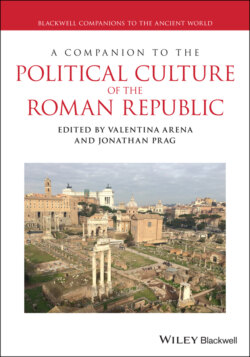Читать книгу A Companion to the Political Culture of the Roman Republic - Группа авторов - Страница 83
NOTES
Оглавление1 1 Gelzer speaks of ‘personal connections’ of various types (including ties of gratitude created by aristocratic munificence directed at the public at large, or at whole sections of the population) and lays no particular stress on patronage in the narrow sense. See Gelzer 1969: 62, 110–116; see on this Yakobson 1999: 79.
2 2 Similarly, Hölkeskamp argues that the usage of the terms ‘party’ and ‘parties’, in modern accounts of the Republic, are ‘contaminated by modern connotation of parliamentary politics’ (Hölkeskamp 2010: 24) – although it might be natural to translate the Roman partes in this way.
3 3 E.g. Brunt 1988: 14–15. He cites Polybius, with his theory of mixed constitution, and Cicero’s acceptance of it in De Republica, against modern ‘purely oligarchic’ interpretations. But although, according to him, the mixed constitution was not quite a ‘sham’, its balance was nevertheless so heavily tilted in favour of the Senate that ‘the system could work only if the people’s share in power was largely specious’ (15, for Brunt’s interpretation of Cicero’s view); cf. 324–327.
4 4 Note however that for Sallust, this describes a certain period of Republican history, rather than the essence of the Republican system of government; ‘for before the destruction of Carthage, the people and the Senate of Rome governed the Republic together peacefully and with moderation’ – Sall. Iug. 41.2.
5 5 E.g. Hölkeskamp 2010: 12–13. Indeed, according to Millar 1998: 210, ‘The exclusive right of the assemblies to pass legislation is by far the strongest reason why, in purely formal terms, the Roman res publica has to be characterized as a democracy.’ He goes on to make clear that this ‘constitutional’ statement is, in his view, only a starting point of the discussion on the real significance of popular politics: ‘It is of course essential to separate the emphasis on these formal features from any assessment in sociological terms of actual patterns of participation.’ But it is true that designating the Republic as ‘a democracy’ in some sense (though with strong qualifications) is characteristic of Millar’s later writings on the subject. See e.g. Millar 2002b: 7 (‘manifold anomalies’), 159 (‘profound, indeed fatal, defects’).
6 6 Note that ‘democracy’ here is only ‘one element’ (as it was for Polybius) of the Republican system; there is no claim here that the Republic was in some (qualified) sense a democracy, as Millar would argue later on. Cf. ibid. 132: ‘No one will dispute the “aristocratic” (not, it should be noted, “oligarchic”) element, namely the centrality of the role of the Senate. To talk of it as a “government”, however, is highly misleading.’ Millar’s insistence that the Senate was not a ‘government’ is not, then, a narrowly ‘constitutionalist’ attempt to deny the Senate’s importance – indeed, centrality – in the system.
7 7 See e.g. Ward 2004: 119. The connection between the debate on the Roman Republic and contemporary concerns is stated explicitly by Millar 2002b: 8–10.
8 8 This certainly seems to be the case in Sall. Iug. 41.2 (see note 4).
9 9 See Mouritsen 2001: 18–37 (voting assemblies), 38–62 (contiones); Jehne 2006: 220–234. Mouritsen suggests that the contiones were ‘traditionally…gatherings of the boni’, though in the late Republic, ‘with the emergence of the populares wider sections of the population’ were apparently ‘drawn into the world of politics’. Jehne rejects (convincingly, in my view), the ‘elitist’ reconstruction of the composition of mid-Republican contiones, as well as Mouritsen’s suggestion that most of the common people would take no interest in the political issues debated at them. A ‘popular’ rather than elitist composition of the contiones is propounded by Morstein-Marx 2004: 42 n. 32 (cf. 122–133) and Tan 2008: 172–180. The legislative record of the tribal assembly in the late Republic (and occasionally, earlier) is, in my view, decisive proof that its composition was not controlled by the ruling class. On the centuriate assembly see Yakobson 1999: 20–64.
10 10 See Ward 2004: 119: late-Republican assemblies ‘had long lost whatever democratic character they may have had in the very early Republic’.
11 11 North 1990: 18. North is nevertheless, as the title of his paper shows, far from dismissing the popular element of Republican politics, bearing in mind that such divisions within ‘the oligarchy’ were far from exceptional.
12 12 On repulsae, see Pina Polo 2012. His findings show that electoral defeat (sometimes, repeated) was a very realistic prospect for a Roman politician, including nobles and those who would eventually reach the highest honours.
13 13 The significance of the instances of legislation passed against strong senatorial opposition, and of the fact that greater changes did not prove possible (or even conceivable) is variously assessed; see Morstein-Marx 2004: 286, qualified by Morstein-Marx 2013; Jehne 2013: 51–52. At any rate, controversial legislation was the usual province of reformers rather than defenders of the status quo; this is one of the reasons why the fact that we only very rarely hear of a bill being rejected by the people’s votes, while significant, should not be taken as proof that legislative assemblies served merely as organs of ritualised consensus; contra Flaig 2003.
